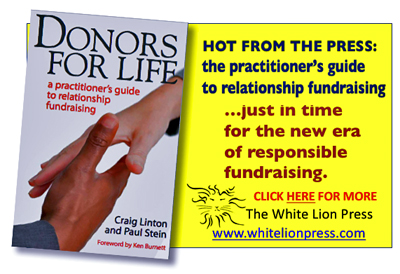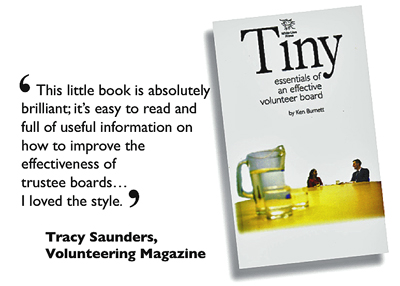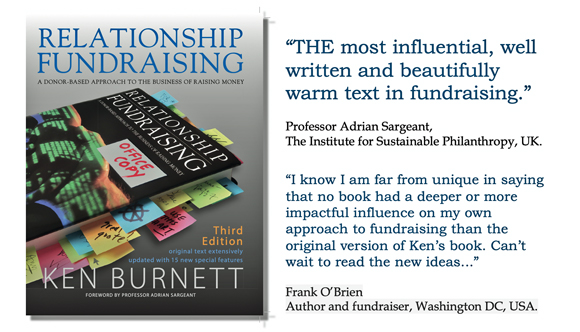|
|
From 2010 The first thing to ask is, do we really want to build an effective fundraising board? Then, do we want our board members all to be effective fundraisers, or do we wish our board to effectively support the fundraising function?
In Britain we have a long and proud tradition of voluntary board service. It’s a national treasure. But if we are honest with ourselves it could really do with revisiting and refurbishing. Books by KenOther feature articles More blogs on fundraising and communication Tales from The Field by the River: Visit SOFII to read more about the adventures of new trustee Warren, in What makes an effective board And for more from Ken Burnett: |
Recently a bright young man from deep inside the Whitehall machine came to see me, to talk about how the British volunteer board might be strengthened and improved (he’d stumbled across a book I wrote on the theme – see below). This young man told me that forthcoming government cuts mean that whoever is ‘in’ after May 6th (we were meeting just days before the 2010 UK general election) will want to transfer yet more current government responsibilities to the voluntary sector. He talked about contracts and capacity and increased flexibility of funding for local authorities, and things like that. Basically what was on the table was less money for all and more central abdication of social provision. But he was worried that, rather obviously, the voluntary sector doesn’t have the capacity to take on more. I felt obliged to agree, but observed that there might be a fantastic opportunity here. Though, I confessed that I have little confidence that anyone in or even close to government will be able to take advantage of it. In Britain we have a long, proud tradition of voluntary board service. It’s a national treasure. But if we are honest with ourselves it could really do with revisiting and refurbishing. Many Brits imagine that our system of voluntary governance and service is the envy of the world. So it could be, but I fear it’s not at the moment. In Scandinavia they have a longer and perhaps prouder tradition of building boards that is based on a more rigorous and professional approach. From what Scandinavian friends tell me, they’re more thorough and better at it than we are.
There is an opportunity here. Our society, increasingly fed on a culture of greed and celebrity that gets shallower by the day, is leaving many among its population searching for interest, purpose and fulfilment in their lives. It would not be difficult to sell the notion of effective voluntary service to the coming generation. But, for sure we need to overhaul and update the product first – the antiquated but accurate image that charity boards now enjoy will not appeal to many young people these days. One difference in Scandinavia is that standards and expectations of board members are clearer and better understood. Scandinavians are encouraged into volunteer governance roles from an early age and expect to discharge their responsibilities properly against clearly specified and universally understood objectives and procedures. There is a culture of results-oriented, accepted best practice that’s absent in too many British boards. Nordic boards are less hampered by notions of elitism, hierarchy and smug self-satisfaction. There, board members have to deliver against objectives, or get off. Scandinavians think nothing of being required to do just that.
The real opportunity for change now will be if we invest in building the capacity of volunteer boards by redefining, then effectively promoting, a new brand of selfless voluntary service that really will make a difference to modern British public life. But if then the man from the government were to come back and ask me how would we do that, I’d have to say it’ll take more than good intentions and cosmetic change. What’s needed has to go much deeper. Enter the fundraising trustee It’s a great and important idea. But alone it will not solve the problem of a poorly performing board. And appointing a fundraising trustee, however qualified, should not absolve other board members from engagement in fundraising. For most charities the funding of the organisation is so crucial that its oversight unquestionably has to be a prime responsibility of the entire board. So while I fully support Lindsay and the others, I wonder how many fundraisers will take up the challenge and what kind of a board structure they will be going into, if they do. Raised expectations will be quickly dashed if the potential for boards to change isn’t there. The proposition to these young enthusiasts hasn’t been articulated as well as it might be. Before we encourage the coming generation to submit themselves for selection to board positions, the currently prevailing paradigm needs real change. Really difficult questions Irritating but true for most charities if the question is, ‘how should we build an effective fundraising board?’ Not to mention that even more thorny issue, how should the sector work towards encouraging trustees to lead fundraising not just rhetorically, but by example, with their own cash? (Lack of space means this important subject will have to be an issue for another day.) Continued at top of column two |
Continued from column one First things first The first thing an organisation needs to do is to ask, do we really want to create, or to build over time, an effective fundraising board? Then, do we want our board members all to be effective fundraisers, or do we wish our board to effectively support the fundraising function? Both are worthy aspirations. We should learn to walk before trying to run. Many problems arise in the not-for-profit world because boards appoint fundraisers rather than the other way around. If fundraisers play a significant part in recruiting their trustees then they’ll look for and locate several suitable trustees who would not merely ‘get’ fundraising, they would come to the board prepared and equipped to play their part in the fundraising process as and when required. Not everyone on the board needs to be a fundraiser. Our model of boards that govern in close cooperative tandem with a professional management team is vastly preferable to the American model, where board members are selected for their fundraising or donating potential and often contribute little else. There is, of course, nothing magic or particularly difficult about the role of a fundraising trustee. But we need to spell out what’s required. We need to give trustees a job specification and to interview at least three potential candidates for each post, turning down at least two of these and perhaps all three if none are suitable. ‘Jobs for the boys’ has no place in the British boardroom now.
Board members serve the organisation, not the other way around. Board seats are limited and it’s a privilege to be considered worthy of occupying one. If a board member is inert, incompetent or ineffective, he or she needs to be told so in no uncertain terms so she will make way for someone who is active and productive. Empowering the fundraising trustee, however, will take more than just an influx onto boards of enthusiastic, experienced fundraisers, welcome though that would be. It will require a fundamental overhaul of the way we want boards to be viewed and to operate. © Ken Burnett 2010 This article first appeared in the magazine Caritas in June 2010. Ken Burnett served on the board of ActionAid from 1995 to 2009 and was chair of trustees from 1998 leading up to internationalisation of the organisation in 2003. Throughout his time on ActionAid’s board Ken was the trustee specifically responsible for fundraising. Ken Burnett is also a past board member of The Institute of Fundraising, The Resource Alliance and Book Aid International. He is author of Relationship Fundraising, The Zen of Fundraising and several other books including Tiny Essentials of an Effective Volunteer Board. Ken is also founder and managing trustee for the archive of fundraising best practice, the Showcase of Fundraising Innovation and Inspiration (SOFII), a free resource for fundraisers worldwide. To plug any serious gaps on your library shelf, click here, or here. |






